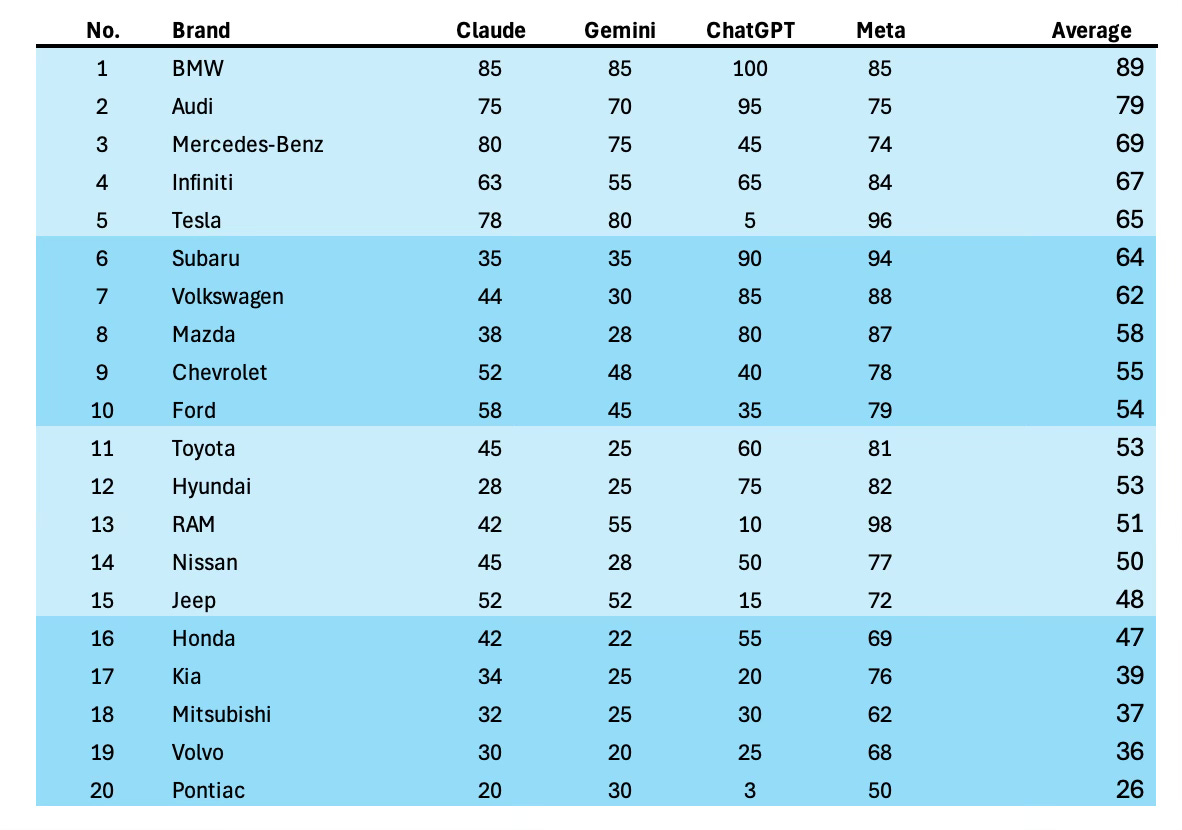Rob's Notes 14: Is it the Driver or is it the Car?
A quick look at vehicle accident data and "perceived driver rudeness"
Some widely-shared articles referencing data about Tesla vehicles having a high accident fatality rate (despite their cars reportedly having better-than-average safety characteristics) intrigued me this week.
Source: Dall-E (OpenAI)
I came across an analysis done last year by LendingTree based on insurance quote data that assessed driving incident data (combining accidents, DUIs, speeding and citations) per 1,000 drivers from 11/2022 to 11/2023. It found that Ram, Tesla and Subaru had the worst drivers by this measure:
The combined data (incidents) puts Tesla second overall after Ram, and “Tesla drivers had the highest incident rate in 11 states — aside from Ram, Tesla was the only other brand in the double digits” states the LendingTree analysis, available here. When you look at the portion of the incident data that is traffic accidents, “Tesla drivers have the highest accident rate compared with all the brands analyzed. During the period analyzed, Tesla drivers had 23.54 accidents per 1,000 drivers.”
The DUI data is pretty damning too - but not for Tesla. According to LendingTree, BMW drivers have a significantly higher number of DUIs compared to other drivers — 3.13 per 1,000. This DUI rate is well in excess of the second highest rate, for Ram drivers at 1.72.
Why might Tesla have a high incident rate?
The following hypotheses may or may not be supported by other data (and some of this is pretty anecdotal) but it’s worth considering whether these are possible explanations:
Overreliance on Autopilot: While Tesla's Autopilot system is advanced, it's not perfect. Some drivers may become overly reliant on it, leading to inattentiveness and delayed reactions when they need to take control. This can cause sudden braking, erratic lane changes, or even accidents.
Acceleration/Speed/Demo skew: Teslas are known for their rapid acceleration, and some drivers may be tempted to show off this capability, leading to speeding and dangerous maneuvers. Part of this could just be demographic. Per this 2023 article, Tesla owners tend to be upwards of 70% male and higher income (2x the national median). And long-standing data shows that unfortunately, “men are likelier to die on the road than women by a considerable margin”.
“The IIHS found in a 2015 study that 71% of all serious car accidents involving motor vehicle crash deaths involved men, with women making up a mere 29% of deaths” in spite of male/female drivers being relatively evenly represented.
I’m guessing many people will have opinions on car brands and their drivers beyond the above brands, so I thought it worth trying to distill how those collective opinions show up in the current world of “AI answer engines”. It’s intriguing to ask these still-pretty-black-box interfaces some questions about car brands.
Asking the Engines
I played around with various questions about safety and attitudes, but instead decided it might be useful to go LESS scientific that the studies and data I referenced above. There is a lot of collected perception data compressed into these enormous datasets just waiting to be teased out. So I asked each major engine about perceived driver rudeness in the United States. I asked each engine to give a subjective score from 1 to 100 for that for each major brand in the United States, and the results were intriguing.
I should note: because this is such a subjective question, a couple of the engines rightly either warned me against doing this or outright refused (at first, but all caved when I pressed them). Claude for example said in delivering the results that “This list is entirely based on stereotypes and common perceptions rather than any scientific data. Individual driver behavior varies greatly regardless of vehicle brand.”
So take this with a grain of subjective salt please! I used ChatGPT 4o, Claude Sonnet 3.5, Gemini Advanced and Meta AI (Llama 3.2).
I excluded any brands any of the engines didn’t give a score for, and also left out brands where ChatGPT 4o gave a score of just 1 of 100. Note: ChatGPT seems to “like” Tesla, giving it a score of 5 out of 100 whereas it ranks very highly per the other engines and so it drops down to #5 on the list! When I asked ChatGPT why it gave Tesla such a good score, one of the reasons it cited was that:
“Tesla owners may also strive to represent the brand positively due to its distinct and high-profile identity, avoiding behaviors that might tarnish its image.”
So as my favorite college computer science professor used to say, your mileage may vary!
“Perceived Driver Rudeness” by US Car Brand, According to AI Engines
Sources: ChatGPT (OpenAI), Claude (Anthropic), Gemini (Google), Meta AI (WhatsApp/Meta)





